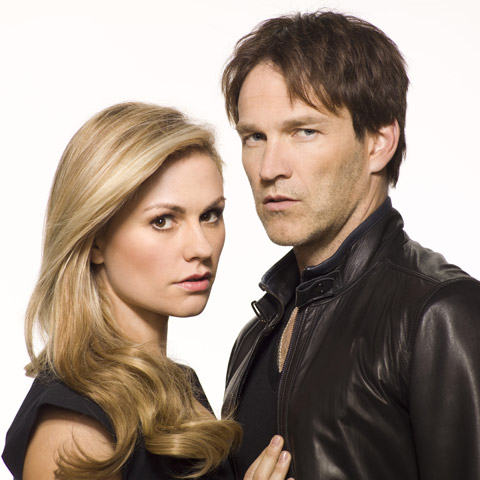
JUICED A sassier Sookie, a slicker Bill, and an homage to Sid and Nancy all help up the game on the new season of True Blood. |
Early on in the thrilling new season of True Blood (Sunday at 9 pm on HBO), Sookie Stackhouse sits down at her kitchen table — the very same table where, in season one, she ate the remnants of her murdered granny's pecan pie — and cracks open a book. Look closely enough and you can see that it's a Charlaine Harris hardback.
Harris, of course, wrote the novels upon which the television show is based. If the bestseller lists are any indication, many of the show's fans have likely read them by now, probably to escape the pedantry of the Harris initiates who dominate True Blood discussion forums.
In making such a brazen nod to their ur-text, it would seem that the HBO writers are forcing Harris fundamentalists to realize that the show can and should be judged on its own terms. Whatever the writers' intent, the mere existence of metatextual ambiguity in a show centered on vampire fucking should earn series creator Alan Ball an honorary doctorate if there's any justice in this world.
This season begins with a cheesy and brilliant deus ex machina: Sookie winds up in a pastel fairyland filled with glowing fruit and soft moaning noises. When she returns to Bon Temps, she discovers that she has spent more than a year among the fey, and that everything has changed.
This means changes for Vampire Bill. Thank God for that — Stephen Moyer's wooden delivery of thin material has long made Bill the show's most problematic character. I have found myself praying for his true death on more than one occasion. Now that Bill's a powerful slickster, he's markedly less grating than the chivalrous simp of seasons past. Even his clothes are less annoying: he's traded in the Henley and the Russian mobster track jacket for sharp business casual. He even has an interesting back story, one that unfolds, in part, through a brilliant homage to Alex Cox's Sid and Nancy.
Other characters have changed, too. Young vampire (and eternal virgin) Jessica and lovestruck mortal Hoyt have left their honeymoon phase and entered into a dark codependence (echoes of Cox again: open sores under bluish light are all the more lurid). Divorcee Arlene, now raising faux Cajun serial killer Rene's demon spawn, sends Carrie Preston into high-camp mode, thus making full use of her considerable gifts as a comic actress. And Sookie best friend Tara — weepy, inconsolable Tara — has, for reasons unknown, become a lesbian ultimate fighter. ("Good — maybe this'll stop her whining," my boyfriend remarked.) Sookie herself has changed, too. She's sassier and quicker to rile.
Even the struggle for vampire equality is different. The King of Louisiana's televised vendetta against the human race was a PR disaster for the cause, and at many points throughout the first episodes we're reminded that this is a post–Russell Edgington world, one even more dangerous for supernatural beings. Though the erstwhile Fellowship of the Sun was both too boring and too self-congratulatory in its satirization of anti-gay fundie weirdos, the new crop of flip-cam-toting, Internet-savvy homo- . . . er, vampire-phobes, is promising.